#pioneering journalist
Text
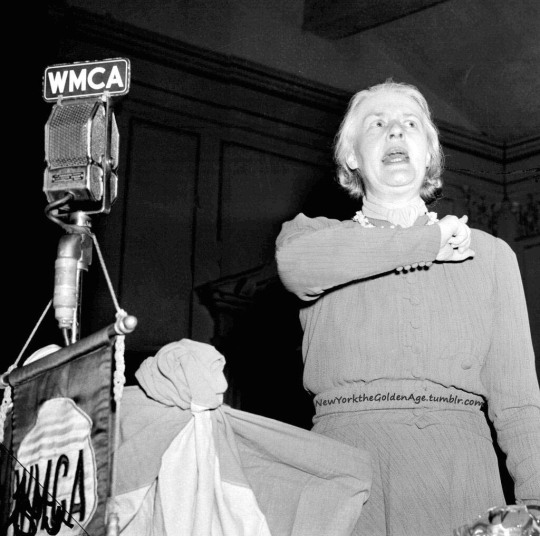
Dorothy Thompson, a columnist for the Herald Tribune and host of a nationally syndicated radio program, was one of the few American journalists who recognized Hitler for the danger he was. Despite being ridiculed, she wrote and broadcasted repeated warnings about the Nazi threat throughout the 1930s. In 1939, she was ejected from a German-American Bund (American Nazi Party) rally for heckling the speakers. Here, she receives an ovation as she speaks at a "tolerance meeting" at Carnegie Hall, March 3, 1939, which was held in response to the Bund rally. She addressed a capacity crowd.
Photo: Murray Becker for the AP
#vintage New York#1930s#Murray Becker#Dorothy Thompson#Nazism#March 3#3 March#Hitler#rally#anti-Hitler#pioneering journalist#speaker#speech
60 notes
·
View notes
Quote
Journalist B N Uniyal was the first to train the spotlight on caste in Indian media, through his piece 'In Search of a Dalit Journalist', which was published in The Pioneer on November 16, 1996. A foreign reporter had asked Uniyal for an introduction to a Dalit journalist. Uniyal realised he did not know one. He analysed 454 caste surnames of 686 journalists accredited by the Press Information Bureau. There was not a single Dalit among them. He called up 47 of the remaining 232 accredited journalists—and still drew a blank. To celebrate the dawn of the new millennium, The Pioneer invited Uniyal to write for its eight-page Dalit supplement. He sent them the 1996 piece with the following addition: “The article…was totally ignored by our journalistic establishment… None felt aghast or alarmed at the situation described in the article.”
Ajaz Ashraf, ‘Bitter pill: Caste in the newsroom’, Mid-Day
#Mid-Day#Ajaz Ashraf#India#BN Uniyal#In Search of a Dalit Journalist#casteism#Indian media#Pioneer#Press Information Bureau#accredited journalists#journalistic establishment
10 notes
·
View notes
Photo

@kcnorthbear
BARBARA WALTERS: 25 SEP 1929 - 30 DEC 2022
3 notes
·
View notes
Text
Barbara Walters, the intrepid interviewer, anchor and program host who led the way as the first woman to become a TV news superstar during a network career remarkable for its duration and variety, has died. She was 93.
Walters' death was announced by ABC on air Friday night.
“Barbara Walters passed away peacefully in her home surrounded by loved ones. She lived her life with no regrets. She was a trailblazer not only for female journalists, but for all women,” her publicist Cindi Berger also said in a statement.
youtube
#Barbara Walters#rest in peace#December 30th 2022#Journalist#News#News pioneer#Newscaster#The view#Groundbreaker#celebrity death#tw celebrity death#celebrities#Youtube#Barbara Walter's sassiest Interviews#sharon osbourne#ozzy osbourne#Robert Kardashian#whitney houston#Bobby Brown#barbra streisand#Celiene Dion#Cher#Joan Rivers#Julie Andrews#Mariah Carey#Katherine Hepburn#Lady Gaga#Michael Jackson#Miley Cyrus#Elton John
2 notes
·
View notes
Photo
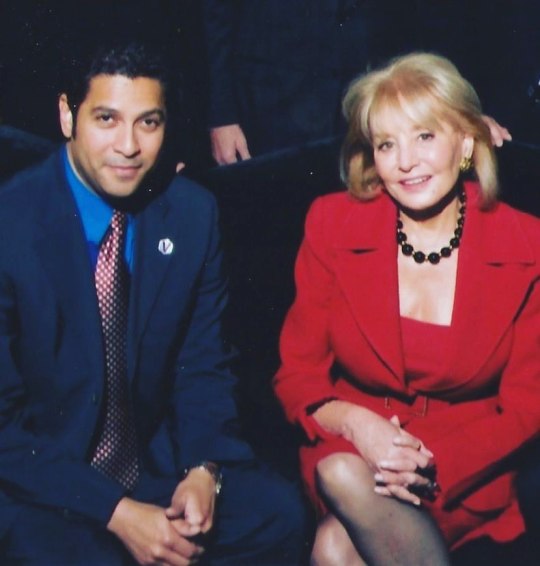
RIP #BarberaWalters #Pioneer #WomensRightsareHumanRights #Journalist #NickySpauldingArt (at Four Seasons Residences) https://www.instagram.com/p/Cm1vULCLG3s/?igshid=NGJjMDIxMWI=
1 note
·
View note
Photo
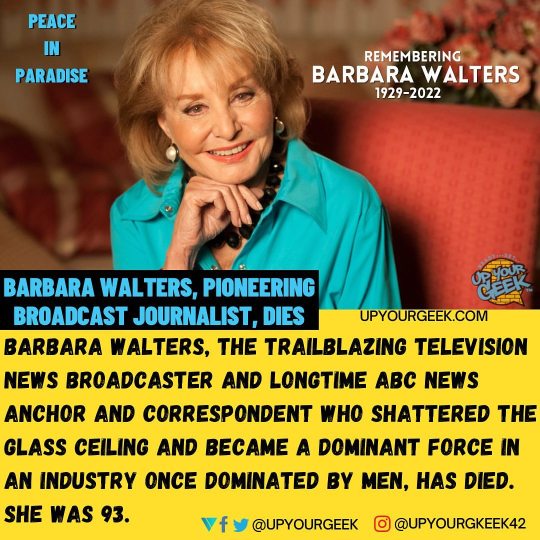
SAD NEWS: Barbara Walters, an iconic broadcast journalist who broke down barriers for women in media, died Friday, according to ABC News. She was 93. In a career that spanned more than five decades, Walters established herself as one of the most prominent and respected broadcasters on television. She made history when she became the co-host of “ABC Evening News” in 1976, marking the first time a woman co-hosted an evening news network on national television. She was most known for her time as a co-host of ABC’s “20/20,” a role she held for 25 years. In that time, she interviewed some of the world’s most influential and controversial leaders, celebrities and political figures ― including former Cuban dictator Fidel Castro, actor Katharine Hepburn and pop icon Michael Jackson ― in often emotional and intense segments. Walters’ legacy of telling incisive, entertaining stories with compassion and poise inspired women to excel in an industry where they were once not welcome. #PeaceInParadise #RIP #BarbaraWalters #RIPBarbaraWalters #ABCNews #Achor #Icon #Pioneer #Legend #Journalist #TheView #EmmyWinner https://www.instagram.com/p/Cm0WLKBMJH1/?igshid=NGJjMDIxMWI=
#peaceinparadise#rip#barbarawalters#ripbarbarawalters#abcnews#achor#icon#pioneer#legend#journalist#theview#emmywinner
0 notes
Text
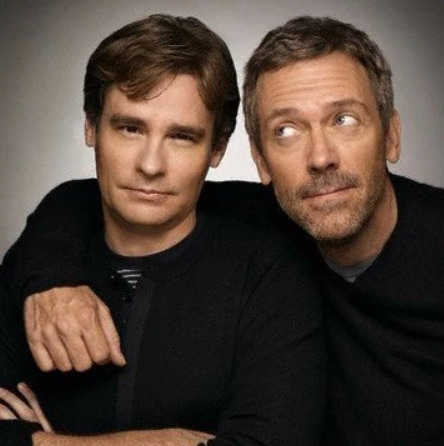
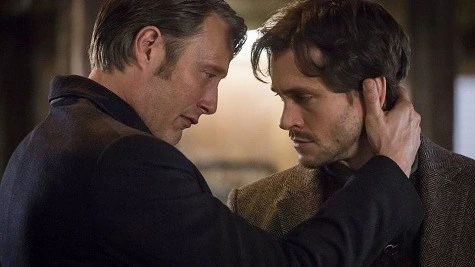
Gay wrongs tournament, quarterfinals of the major bracket
Propaganda:
For House and Wilson:
Literally the most insane couple of all time from medical malpractice the show. They’re best friends, they live together, they’ve drugged eachother, they make stupid bets together, they manipulate each other, they ride off into the sunset together. They’re Sherlock and Watson, they’re the best doctors in their fields and you’d never want them anywhere near your medical care.
Medical malpractice <3
For Will and Hannibal:
Ive previously only heard the term "murder husbands" refer to hannigram so it feels flitting. The whole series culminated with a murder they did together bathing in blood.
The show and ship that coined murder husbands. It’s in the text in s3 from a journalist side character. They do Many murders either together or as a message to each other. Usually this involves turning the dead body into an art piece. The show ends with them killing a guy together in a slo mo scene backed by porno music.
They're both batshit and manipulative.
ALRIGHT so they're not canonically together but it is HEAVILY implied and they have some sort of fucked up psychosexual obsession with each other. in the later parts of the show they start committing murder and cannibalism together and they're soooo unhinged but it's awesome
kill people for each other. maim each other. kill people together. most batshit insane metaphors. send each other to jail. ruin everyone’s lives. someone can probably say this better than me but these gay people are insane
Literally THE murder husbands. They kill for each other. They've tried to kill each other. They're canon in all but name, like the homoeroticism between these two is the driving force of the show.
one time hannibal folded a guy into an origami human heart
They are in love and they kill and eat people. They are called Murder Husbands in canon.
The original murder husbands (literally, that's not just their ship name, they get called that in canon)
The show begins with Will working for the FBI and trying to catch Hannibal, but because Hannibal is so intrigued by the way Will is able to see the world and the motives behind the killings so easily, it becomes a game of Hannibal isolating Will even more from the people around and seducing him to try and kill. By the time Will starts embracing the side of him that Hannibal sees, he starts oulling back and trying to distance himself so that when the time comes for Will to fully embrace himself and Hannibal, no one really suspects what they have planned.
hannibal literally does murder as courtship and it works bc will is also a fucked up little guy
I'm actually quite offended they aren't included by default (joke). They are THE murder husbands!!!!!! (mod note: they should have been, but I wanted to see how many submissions they'd get. They got 19, making them a little more than 6% of total submission count).
do i have to say it. they literally get called murder husbands IN THE SHOW
There are 3201 works for Hannibal on ao3 tagged Murder Husbands. They are the ogs, they are the pioneers we owe it all to them.
THEE murder couple. You know it. I know it. They commit crimes at each other as courting and then commit crimes together and then fall off a cliff to wash up somewhere and live on to serve cunt. Get referred to as 'murder husbands' in canon. What more do you need
Hannigram were literally called Murder Husbands in canon, they are the og, they are THE blueprint. They were gay as hell and comitted so much murder so many crimes. THEY RAN OFF TO EUROPE TOGETHER.
#gay wrongs tournament quarterfinals#hanningram#hilson#hannibal nbc#house md#hannibal lecter#will graham#gregory house#james wilson
394 notes
·
View notes
Text
asteroid fama [408] ✨
When you look at where Fama sits in your birth chart—the sign and the house—it gives clues about the kind of recognition you might attract and in what areas of life you're most likely to shine or be acknowledged by others.
For example, if Fama is in a creative sign like Pisces, it might mean you could gain recognition for artistic talents. If it's hanging out in the 10th house, which is all about career and public image, fame might come through your professional life.
What does your Fame placement say about your journey to fame?

✨ Through The Signs ✨
Aries: You're gonna be famous for being a trailblazer. Think pioneering a movement, inventing something out of this world, or being the first to do something daring. Your fame comes from your courage and audacity to jump headfirst into challenges. You're the trendsetter, the one who plays by their own rules.
Taurus: Your fame will be built on your sensual pleasures and a keen eye for beauty. Perhaps launching a revolutionary beauty brand, becoming a culinary genius, or even leading a movement towards sustainability. Your consistency, reliability, and connection to the material world make your contributions lasting and impactful.
Gemini: You'll be famous for your words. This could mean becoming a viral social media influencer, an author of groundbreaking books, or a journalist who changes the public discourse. Your quick wit, curiosity, and ability to communicate complex ideas in simple ways will be your ticket to fame.
Cancer: Your path to fame is through emotional connection. Whether it’s as a caregiver making a significant impact, a family vlogger who captures the hearts of millions, or a creator of a home-based empire, your innate ability to nurture and care for others will make you a beloved figure.
Leo: You're destined to be famous for your dramatic flair and heart of gold. Think of becoming a celebrated actor, a philanthropist who’s always in the spotlight, or a creator whose work is bold and makes a statement. Your warmth, generosity, and desire to be seen will bring you adoration and acclaim.
Virgo: Fame comes to you through your service and meticulous attention to detail. You could become famous for innovating health and wellness, starting a movement towards efficiency, or being an activist for the betterment of society. Your practicality and ability to solve problems will earn you respect and recognition.
Libra: You'll be famous for bringing beauty and harmony to the world. This could be as a fashion icon, a diplomat who brings peace to troubled regions, or an artist whose work speaks to the balance of life. Your charm, sense of justice, and ability to connect people will be at the heart of your fame.
Scorpio: Your fame will stem from transformation and depth. Whether it’s as a powerful influencer who speaks about taboo topics, a researcher who discovers something revolutionary, or an artist who isn’t afraid to explore the dark sides of life. Your intensity, passion, and resilience will draw people to you.
Sagittarius: You’re going to be famous for your adventures and philosophical insights. Think of being a travel vlogger who goes to the edges of the earth, a motivational speaker who inspires with tales of adventure, or an educator who brings new ways of thinking to the masses. Your optimism, love for freedom, and quest for truth will capture the world’s imagination.
Capricorn: Your route to fame is through your ambition and incredible work ethic. You might become a renowned entrepreneur, a political leader who enacts significant reforms, or an authority in your field of expertise. Your dedication, discipline, and leadership skills will make you a figure of respect and admiration.
Aquarius: You'll be famous for your innovation and humanitarian efforts. This could be as a tech mogul who invents something life-changing, an activist who rallies for social justice, or a visionary artist whose work predicts the future. Your originality, independence, and commitment to making the world a better place will be your legacy.
Pisces: Your fame will come from your creativity and empathy. Whether it’s as a musician who touches the soul, a filmmaker who crafts otherworldly narratives, or a healer who brings comfort to many, your ability to connect with the emotional and spiritual realms will make you beloved and celebrated.
✨ Through The Houses ✨
1st House (The Self, Identity): Fama here makes you famous for simply being you. Your personality, appearance, or a specific trait about how you present yourself to the world is what will catch the public's eye. Think of becoming an influencer or public figure known for your distinct style or personal brand. You're the face in the crowd that everyone remembers – for your charisma, your look, or that indefinable something that makes you, well, you.
2nd House (Values, Possessions): With Fama in the 2nd house, your fame could come from your wealth, assets, or a revolutionary approach to personal finance. Imagine becoming a celebrated entrepreneur with a Midas touch or an influencer who changes the game in sustainable living and values. Your possessions or your unique take on valuing them could become your claim to fame.
3rd House (Communication, Community): Here, Fama could make you famous for your words – be it through writing, speaking, or social media. You could become known in your local community or on a broader scale for your ideas, your way with words, or your connections. This is the blogger who starts conversations, the speaker who inspires, or the social butterfly whose network seems to know no bounds.
4th House (Home, Family): Fama in the 4th house could bring fame through your family, your heritage, or your home itself. This could be as a family vlogger, an advocate for home-based businesses, or someone who becomes a public figure through real estate or interior design. Your foundation, your roots, or the way you nurture and care could be what puts you in the public eye.
5th House (Creativity, Love, Children): With Fama here, your fame might stem from your creative endeavors, your children, or your romantic escapades. You could be celebrated as an artist, a performer, or a creator whose work captures the heart. Alternatively, your role as a parent or your approach to love and dating could thrust you into the limelight.
6th House (Work, Health, Service): Fama in the 6th house suggests you could become famous for your work ethic, your service to others, or your approach to health and wellness. Think of becoming known for your groundbreaking health regime, your dedication to public service, or being the hardest worker in the room whose efforts finally get recognized on a grand scale.
7th House (Partnerships, Public Enemies): Here, Fama could make you famous (or infamous) through your partnerships or your rivalries. This could be a high-profile business partnership, a marriage, or even public feuds that catch the world’s attention. Your ability to collaborate or your encounters with adversaries could be your path to fame.
8th House (Transformation, Shared Resources): With Fama in the 8th house, fame could come through transformation, crisis, or managing shared resources. This might mean becoming known for overcoming significant personal obstacles, working in fields related to finance, inheritance, or psychology, or becoming a symbol of rebirth and change.
9th House (Philosophy, Foreign Travel): Fama here could bring fame through your adventures, your beliefs, or your academic pursuits. Imagine being recognized for your travel vlogs, your philosophical or spiritual teachings, or your contributions to higher education. Your quest for knowledge or your journey to far-off lands could be what makes you known.
10th House (Career, Reputation): In the 10th house, Fama suggests your fame will be tied closely to your career and your public standing. This is the CEO, the politician, the celebrity whose work in their field earns them widespread recognition. Your achievements, your status, or your authority in your profession could be the source of your fame.
11th House (Friendships, Goals, Social Groups): With Fama in the 11th house, you might become famous for your social activism, your innovative ideas, or your role within a group. This could be as the leader of a movement, an inventor whose creations change society, or someone whose circle of friends includes the who’s who of the public eye. Your dreams and the people you surround yourself with are your keys to fame.
12th House (Secrets, the Subconscious): Fama in the 12th house could mean your fame comes from what’s hidden, your inner world, or your ability to heal and help from behind the scenes. You could become known for your spiritual insights, your charitable work, or your artistic endeavors that touch on the universal human experience. Your connection to the collective, your compassion.
xox astro ash ✨
Get your own astrology reading @ astroash.net
TikTok - astroa3h
#success#astrology#house placements#popularity#asteroids#horoscope#spirituality#astro observations#fame#fama asteroid#asteroid fama#astrology reading#zodiac signs#fame indicators#astrology blog#daily astrology#astrology houses#horoscopes#zodiac#astro placements#birth chart#fame in astrology
326 notes
·
View notes
Quote
In terms of format, this was classic Republican propaganda — literally. As historian Rick Perlstein noted, the town hall setup with a favorable audience was the same one that Richard Nixon’s campaign pioneered under Roger Ailes, who died in 2017. The key for Ailes was to produce a show where Nixon could be a gladiator fighting the moderator for a rapturous audience. When Ailes resigned from Fox News after female employees accused him of sexual harassment, Ailes went on to serve as a debate adviser for Trump’s 2016 presidential campaign. And wouldn’t you know it, Fox News gave Trump his own town hall with a rapturous audience in 2020.
Last night, CNN too handed Trump a rapturous audience on a platter. The crowd was stocked with Trump supporters: Trump himself was reportedly allowed 15 people of his own (though none asked questions), and reporting indicates that party loyalists were asked to attend as well. It’s unclear what vetting, if any, CNN did.
The CNN Trump town hall was nothing more than GOP propaganda
CNN knew *exactly* what they were doing. Collins knew *exactly* what would happen.
How do I know this? I am not a professional journalist or news person, and even I knew exactly what would happen, all the way down to Trump calling her nasty. If I knew this would happen, there is no way the experienced professionals at CNN didn’t know.
CNN got exactly what it wanted. It would appear, on the surface, that maybe it won’t work out for CNN the way the network thought it would. I hope that’s true. I hope there are meaningful consequences for a so-called news network gleefully and enthusiastically betraying their audience’s trust to run right wing propaganda for ratings.
434 notes
·
View notes
Text

When you get publicly slapped by 4 surrealist poets because you insulted a guy's historical crush
(translation and context under the cut)
Gallantly Defending Robespierre’s Honour
In the conservative daily paper, Le Gaulois, on March 3, 1923, the journalist and man of letters, Wieland Mayr, expressed his pleasure: there would not be, he wrote, a "vile apotheosis" for "that holy scoundrel" Robespierre. On the other hand, Mathiez had the Surrealists with him. Following the article in Le Gaulois, Robert Desnos (1), accompanied by Paul Éluard (2), Max Ernst (3), and André Breton (4), summoned Mayr in a café and publicly slapped him for insulting the memory of "the Incorruptible."
Why did Mayr get Slapped?
In short: studying history in the 1920s was a messy business, especially when it came to the French Revolution….
To explain why Mayr ended up getting slapped, please allow me to briefly dive into the French Revolution's historiography during the late 19th and early 20th centuries. Keep in mind, that this is a grossly oversimplified version.
Before 1848, it was pretty standard for French republicans to proudly see themselves as inheritors of Robespierre’s legacy. (If you’ve ever wondered why in Les Misérables, Enjolras’ character is very much channeling Robespierre and Saint-Just, here’s your answer!) However, things start to change with the Second Republic.
In 1847, Jules Michelet brought back the negative portrayal of Robespierre as a tyrannical "priest" and leader of a new cult. This narrative helped fuel an increasing dislike for Robespierre, with radicals like Auguste Blanqui arguing that the real revolutionaries were the atheistic Hébertists, not the Robespierrists.
Jump to the Third Republic, and the negative sentiment towards Robespierre was only getting stronger, driven by voices like Hippolyte Taine, who painted Robespierre as a mediocre figure, overwhelmed by his role. This trend was politically motivated, aiming to reshape the Revolution's legacy to align with the Third Republic's secular values. Obviously, Robespierre, the "fanatic pontiff" of the Supreme Being, didn’t quite fit this revised narrative and was made out to be the villain. Alphonse Aulard (a historian willing to stretch the truth to make his point) continued pushing Danton as the face of secular republicanism. Albert Mathiez, one of Aulard’s students, was not having any of it and strongly disagreed with his mentor’s approach.
The general disdain for Robespierre began to shift after World War I. One reason was that people could better appreciate the actions of the Revolutionary Government after experiencing the repression during the war themselves. Albert Mathiez and his colleagues were actively working to change Robespierre's tarnished image. With tensions high, it's no wonder Mayr ended up being publicly slapped by a bunch of poets who were defending the Incorruptible's honour!
Notes
Robert Desnos (1900-1945) was a French poet deeply associated with the Surrealist movement, known for his revolutionary contributions to both poetry and resistance during World War II.
Paul Éluard (1895-1952) was a French poet and one of the founding members of the Surrealist movement, celebrated for his lyrical and passionate writings on love and liberty.
Max Ernst (1891-1976) was a German painter, sculptor, graphic artist, and poet, a pioneering figure in the Dada and Surrealist movements known for his inventive use of collage and exploration of the unconscious.
André Breton (1896-1966) was a French writer, poet, and anti-fascist, best known as the principal founder and leading theorist of Surrealism, promoting the liberation of the human mind.
Source: The text in the picture comes from Robespierre and the Social Republic by Albert Mathiez
72 notes
·
View notes
Text
@rowzeoli replied to your post “Do you think part of the D20 journalistic bias...”:
I rarely go on tumblr so sorry if you see me spamming your posts tonight, but I really enjoy your perspective and thoughts! I think I'm the journalist you're referencing in regards to the Fantasy High Junior Year article and unfortunately 1) journalists only get access to interview subjects at very specific junctions (usually press day before the series goes out or halfway through) 2) most publications are honestly Going Through It and cutting freelance rates and just not paying to cover AP
So I'll be totally honest - I post on Tumblr because I assume it is far more unlikely to be seen and so I can vent freely (hence the fairly harsh tone of the criticism in the original post), but I guess this is a chance to clarify. I don't expect anything to change, nor do I expect you to respond; indeed, I wouldn't blame you if you block me after this. But if readership is down (and who knows? maybe it's not and I'm the outlier), this may be illuminating.
The issue with your specific article - which I brought up relatively tangential to the larger point of "at this point I think Polygon's AP/TTRPG coverage is a waste of time to read" isn't really that it's only an early look at the series; and because Fantasy High Junior Year is at this time ongoing, it's honestly entirely valid that there hasn't been a follow-up. It's, well, the "surface-level and factually wrong" issue.
Dimension 20 was by no means the pioneer of remote recording as you claim in your article; that had long been the default of smaller recorded AP shows well before pandemic lockdown for the simple reason that if you're not a media company the overhead is very low - no need to have a dedicated space or even cameras beyond decent laptops. Burrow's End's puppetry? Critical Role's Call of Cthulhu: Shadow of the Crystal Palace did shadow puppets in 2019. They had diagetic audio on the main campaign as early as 2016. I don't even like Kollok, but that's had complex set design since 2019. Meanwhile premise of the article is yet another rehash of Polygon's "Dimension 20 is CHANGING THE GAME" constant drumbeat, while your actual pull quotes from Brennan Lee Mulligan are him musing that this is simply an entry in an ancient tradition of storytelling and isn't, in fact, terribly novel. The interview fails utterly to back up your point and indeed contradicts it; I get that the timeline was probably tight but this is outright incorrect in multiple places and your argument isn't just unsupported; it's outright dismissed by the very person you claim is proving it. If the premise came before the interview, it needed to be reworked afterwards, and if it came after the interview…I'm not sure what to say, really.
This isn't your article, and I'm putting it here to illustrate that this has been a pattern for Polygon's AP coverage specifically. This article about Worlds Beyond Number is perhaps my favorite example of "this is not serious journalism:" Rusty Quill Gaming, The Adventure Zone, Friends at the Table, and NADDPod are all theater of the mind long-running podcasts (RQG's campaign lasted a whopping 7 years of real time) and that's just off the top of my head; the idea of a long-running edited audio podcast being novel is laughable. RQG and TAZ both started at level 1; I'm not personally familiar with Friends at the Table. I don't actually think starting at level 1 vs. 2 is terribly important in storytelling in the first place other than that a few D&D classes pick their subclass at L2 and that choice can be narratively relevant, which it was in TAZ; however, some classes pick a subclass at L3 so you can still achieve this with a level 2 start (as Critical Role's second campaign does). Both Emily Axford of NADDPod and Griffin McElroy of TAZ have long been composing their own music and RQG is heavily sound designed. These are not obscure pulls, either; these are some of the more well-known names in the space.
At this point, Polygon AP/TTRPG articles - by multiple different writers - simply feel like madlibs: "(actual play show) is groundbreaking in its (thing that other shows have been doing for 5+ years); I especially liked (visual effect) and (incorrect understanding of TTRPG mechanics)."
The people I allude to in the post you responded to as having egregiously uncharitable and sanctimonious takes on Daggerheart (within, again, hours of its publication) are a frequent Polygon contributor and a Rascal editor and they further my mistrust of those publications: There is this constant insistence that everything they like be "groundbreaking" and "innovating" and they will claim this even when it's demonstrably not the case, as the above examples note. As Mulligan says in your article "it’s important to keep new artists with new experiences and backgrounds flowing in," and yet by focusing intensely on high production values (difficult for smaller indie upstarts to have) and by incorrectly claiming that a well-established media company within the space like D20 invented a number of things it flat out did not, this journalism is actively, if unintentionally, working against that goal. As I put it elsewhere, Polygon's bizarre pedestaling of Dimension 20 and simultaneous putdowns of Critical Role (which turn into wild contortions when D20 mainstays like Mulligan or Aabria Iyengar collaborate with CR; for that matter others besides me have observed that Polygon acts like Spenser Starke is two different people, the genius who created Alice is Missing and the knuckle-dragging moron who put out Candela Obscura and Daggerheart) coupled with the obsession with production values over story has the whiff of claiming they're the champion of the little guy for sticking it to the 700 lb gorilla in the space and then focusing on 500 lb gorillas while making it impossible for smaller monkeys to compete because most brand new shows without the name recognition of someone like Mulligan involved can't exactly hire Rick Perry to do their models or Taylor Moore to do sound design.
I suppose a good way to put this, since I've run into this in many spaces, not just AP/TTRPG or even journalism, is that bias on its own in a subjective medium isn't inherently bad; but if something is so nakedly biased against something I love, I will, naturally, turn to it with a far more critical eye, and if its arguments are not ironclad I'm going to start noticing every structural issue in every argument and every tiny mistake. Sure, as a fan of Critical Role, and as someone who feels that Kollok was nigh-unwatchable and that Burrow's End was promising in parts but deeply flawed, I disagreed with Polygon's nonstop mud-slinging towards the former and glowing, verging on fawning reviews of the latter two. But that's not entirely damning on its own; I do get that not everyone will like Critical Role and that some people will love Kollok or Burrow's End for valid reasons. What's damning is the journalism itself is riddled with factual errors and the analysis is so weak that to call the arguments a flimsy house of cards would be generous. The opposite is also true; if Polygon's lead editor were out here repeatedly misspelling the name of one of the main characters in Worlds Beyond Number (note: this has since been corrected) but the articles had compelling arguments, even ones I disagreed with, I'd be far more forgiving, but as is? It's offering me absolutely nothing: it's poorly researched, it's poorly structured, it's poorly written, it's poorly copy-edited, and it shits on things I like seemingly just for clicks. I'm done giving clicks.
I am deeply sympathetic to the pressures facing digital journalism and media and the arts in general; as someone who is fortunate enough not to personally face those pressures and has the income to be a patron, I would love to help in my small way (and I do, at least, financially support a number of the AP shows I love). But the quality of some of this journalism is truly so bad that I can't bring myself to support the institutions putting it out; it's "dead dove do not eat" until such time as someone whose analysis and opinions I do trust cites them (or, perhaps, until there is a sea change of lead editorship). I know that this won't help the crunch, and may make it worse, but I just can't because the quality is so poor. I don't have a good solution to how to write about something that takes a lot of time to watch and process and about which the articles pay very little in return, but the current strategy of bouncing between uninformed provocateur and utter sycophant depending on the show and creators; of drooling over such surface features as shiny production and falsely claiming everything is "groundbreaking" while getting the most basic facts wrong has driven me away.
#rowzeoli#i'm leaving this rebloggable but other people...try to be respectful i will turn off reblogs if need be.#long post
69 notes
·
View notes
Text
Journalist & Sociologist Ida B. Wells

Every year, I make it a point to shine a spotlight on an African American figure who serves as a profound source of inspiration for me. This year, my choice is Ida B. Wells. My first encounter with her remarkable story was during my undergraduate studies. It became apparent why her name wasn't widely discussed before – much of her groundbreaking work centered on the grim reality of lynching in the African American community.
In the academic realm, she and W.E.B. Du Bois were presented as pioneers in the field of sociology, shedding light on the social dynamics of the time. Ever since that introduction, my admiration for Ida B. Wells has only deepened. What sets her apart from many civil rights activists is her refusal to embrace pacifism; she was known to answer her door armed, a bold reflection of the turbulent era she navigated.
Born into slavery, Ida witnessed the abolition of this oppressive institution, only to confront the horrifying reality of African Americans being targeted and killed for merely existing. Her body of work provides a profound insight into the struggles faced by the African American community during that tumultuous period.
One aspect of Ida B. Wells that captivates me is her commitment to journalistic ethics. As a journalist, she maintained a high standard of integrity. Exploring her biography, one finds a narrative that is less about her personal life and more about the impactful work she undertook over the years. Through it all, Ida B. Wells never wavered in her dedication to the fight for the rights of African Americans. Her unwavering commitment to justice and equality serves as a powerful reminder of the resilience required to confront and overcome systemic injustices.
CrowGirl
55 notes
·
View notes
Text
Games are (often) a visual medium, so it’s not like visuals are irrelevant, far from it. But like… I feel like there’s a difference between “cinematography, design, aesthetic” and “changes in what the hardware is physically capable of over time”. Like if you compare films, for example. There was a period where films did not have sound. There was a longer period where films were in black and white, and even after colour became easier to do, it was more expensive, so there were still some productions in black and white for like, a while. But there are plenty of filmmakers from this era who had really impressive or pioneering cinematography techniques, FW Murnau, Dziga Vertov, etc. etc. How are you framing the shot, how are you cutting between shots, that kind of stuff. Still studied to this day. Which is all to say, someone can be like “oh, I don’t like watching movies in black and white,” and (while I’d encourage them to give it a shot) that’s their personal taste that they’re entitled to. But if a critic was like “of course, Sunrise doesn’t completely hold up, because it’s in black and white”—like that would be a ludicrous thing to say! No one would take it seriously. But mainstream game journalists will say that kind of stuff all the time. Just like, as an unstated assumption in passing. “Of course, the graphics aren’t realistic, so it’s not as good as—” arghhhh!
70 notes
·
View notes
Text
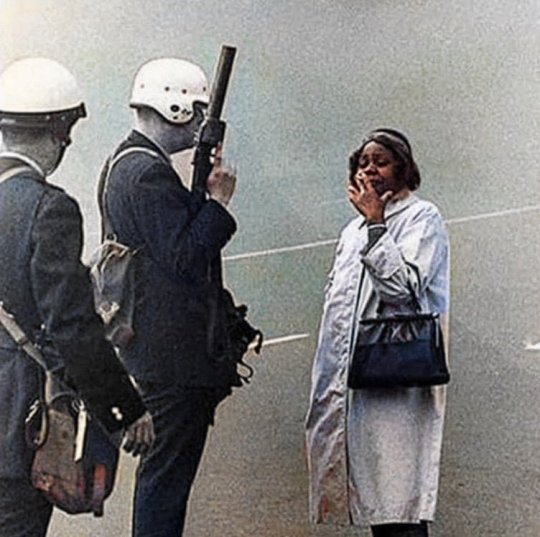
Louisa Jenkins smoking a cigarette as the police try to question her at a protest in 1957.
—Louise Jenkins Meriwether, a novelist, essayist, journalist and social activist, was the only daughter of Marion Lloyd Jenkins and his wife, Julia. Meriwether was born May 8, 1923 in Haverstraw, New York to parents who were from South Carolina where her father worked as a painter and a bricklayer and her mother worked as a domestic.
After the stock market crash of October 24, 1929, Louise’s family migrated from Haverstraw to New York City. They moved to Brooklyn first, and later to Harlem. The third of five children, Louise grew up in the decade of the Great Depression, a time that would deeply affect her young life and ultimately influence her as a writer.
Despite her family’s financial plight, Louise Jenkins attended Public School 81 in Harlem and graduated from Central Commercial High School in downtown Manhattan. In the 1950’s, she received a B.A. degree in English from New York University before meeting and marrying Angelo Meriwether, a Los Angeles teacher. Although this marriage and a later marriage to Earle Howe ended in divorce, Louise continues to use the Meriwether name. In 1965, Louise earned an M.A. degree in journalism from the University of California at Los Angeles.
Meriwether was hired by Universal Studios in the 1950’s to became the first black story analyst in Hollywood’s history. Beginning in the early 1960’s, Meriwether also wrote and published articles in the Los Angeles Sentinel on African Americans such as opera singer Grace Bumbry, Attorney Audrey Boswell, and Los Angeles jurist, Judge Vaino Spencer. In 1967, Meriwether joined the Watts Writers’ Workshop (a group created in response to the Watts Riot of 1965) and worked as a staff member of that project.
Her first book, Daddy Was a Number Runner, a fictional account of the economic devastation of Harlem in the Great Depression, appeared in 1970 as the first novel to emerge from the Watts Writers’ Workshop. It received favorable reviews from authors James Baldwin and Paule Marshall. Daddy Was a Number Runner, is a fictional account of the historical and sociological devastation of the economic Depression on Harlem residents.
Meriwether followed with the publication of three historical biographies for children on civil war hero Robert Smalls (1971), pioneer heart surgeon, Dr. Daniel Hale Williams (1972) and civil rights activist Rosa Parks (1973). In addition to numerous short stories, Meriwether published novels, Fragments of the Ark (1994) and Shadow Dancing (2000). Louise Meriwether has taught creative writing at Sarah Lawrence College and the University of Houston. She is a member of the Harlem Writers Guild.
64 notes
·
View notes
Text
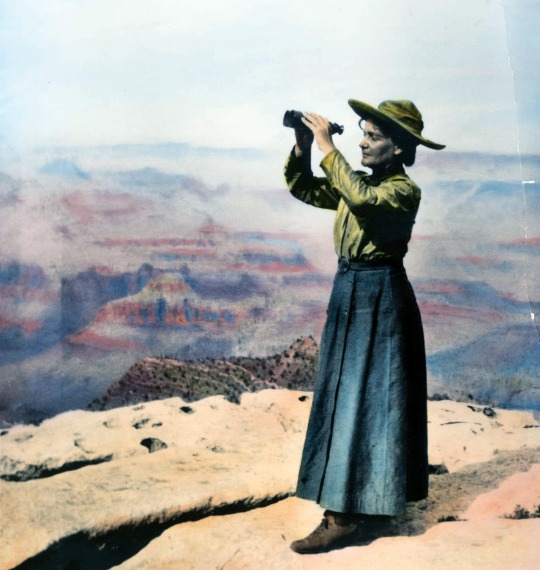
Sharlot M. Hall at the Grand Canyon, 1911. Image hand-colored.
I'm not unwomanly —don't you dare think so— but God meant woman to joy in His great, clean, beautiful world — and I thank Him that He lets me see some of it not through a window pane.
Sharlot Hall, in a letter addressed to Matt Riordan, dated September 10th, 1910.
Sharlot did not regard herself solely as a poet, or even as the journalist which she later became. She had a deep affection for the Southwest, an affection which led her not only to describe its natural features in vivid detail, but to want to preserve what she clearly perceived by the turn of the century to be its vanishing heritage. A pioneer in recognizing the need to record the ways of earlier generations, she collected Arizona artifacts, early documents, and oral histories. She tracked down pioneer Arizona miners, cattlemen, sheepherders, and prospectors, no matter how many miles she had to drive, alone or with a guide, over roads that were often only dim trails in the desert. Narrow-minded neighbors regarded this activity with scandalized horror.
When the Territory of Arizona made the business of collecting Arizona history official, Sharlot saw no reason why sex should make a difference in the choice of the appointee. And after a sharp battle, with the help of influential friends of both sexes, Sharlot became Territorial Historian, the first woman to hold office in Arizona. The trail she broke in gaining this official appointment made it easier for other women, some of them her friends, to follow even into elective offices after Arizona became a state in 1912.
- Margaret Maxwell (A Passion for Freedom: The Life of Sharlot Hall, pages 1-2)
16 notes
·
View notes